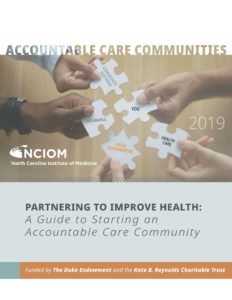


Partnering to Improve Health: A Guide to Starting an Accountable Care Community provides information for those thinking about developing an Accountable Care Community model for community partnership to address the drivers of health.
For too long in the US, discussions around health have focused on health care: who can access care, what type of care, how much care, and who delivers and pays for care. What often gets left out is that health care is only a piece of health and wellness. Although access to medical care is important, health begins long before medical care is needed. Health begins in families and communities, in the places where we live, learn, work, and play. The social and economic factors that affect health include safe families, communities, and housing, and access to healthy food, education, and transportation, among others. These factors are called drivers of health (also called social determinants of health). They directly affect health outcomes like development of disease and life expectancy. They also influence the health behaviors people engage in, like diet and exercise, which in turn impact health outcomes. However, in our communities, people do not all have equal opportunities to be healthy. Differences in experience with drivers of health can lead to health disparities. Health disparities are measurable differences in health status and outcomes between groups. Most traditional health care settings and stakeholders are not designed to address these drivers of health. Long-term sustainable improvements in the health and well-being of community members will best be achieved by addressing the physical, social, and economic challenges that keep people from achieving optimal health.
As the United States health care system wrestles with how to rein in costs and improve outcomes, health care systems and communities across the country have been testing new models of payment and care delivery. One promising strategy to address social and economic drivers of health is the Accountable Care Community model. Accountable Care Communities (ACCs) address health from a community perspective. ACCs bring together a coalition of cross-sector stakeholders that share responsibility to address the drivers of health while reducing, or holding steady, health spending.
As part of the NCIOM Task Force on Accountable Care Communities, Partnering to Improve Health: A Guide to Starting an Accountable Care Community was created to help communities interested in developing ACCs get started. The Guide describes important considerations as an ACC develops, such as leadership, partnerships, governance, financing, and legal matters. The Guide also provides advice for how to move forward in developing the core functions of an ACC.